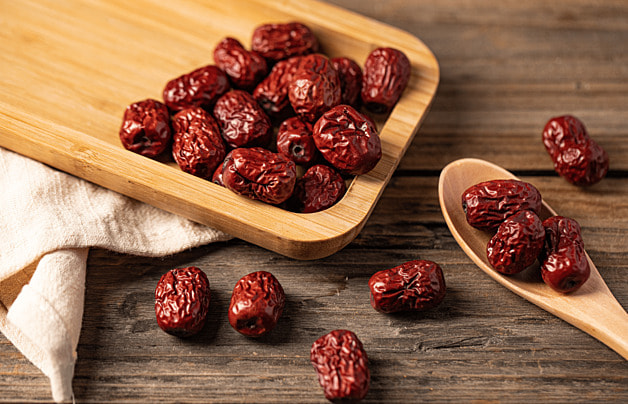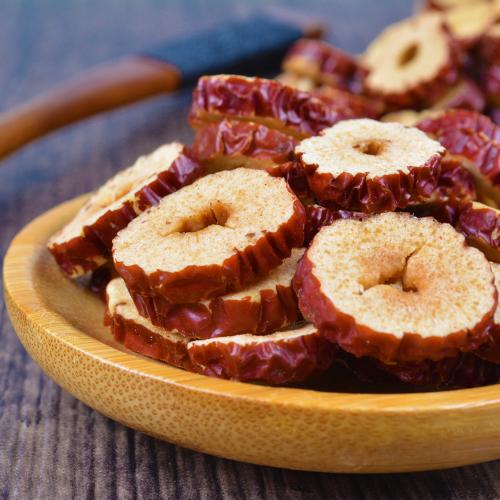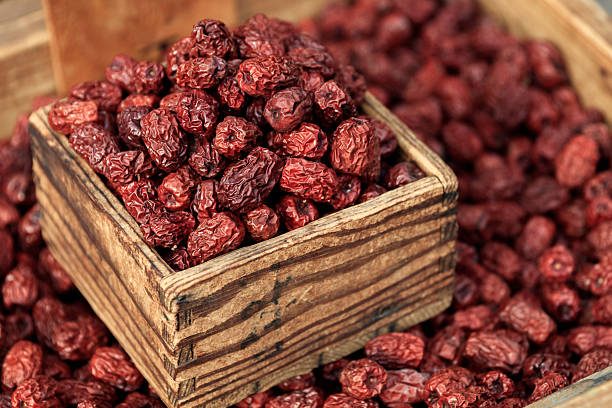Introduction
Jujube, also known as red date, Chinese date, or Indian plum, is a small, reddish-brown fruit that grows on the Ziziphus jujuba tree, which is part of the buckthorn family (Rhamnaceae). Native to China, jujube has been cultivated for over 4,000 years and is widely used in traditional medicine, food, and wellness practices across Asia, the Middle East, and more recently, in Western countries.

English: Jujube, Chinese Date
Hindi: बेर (Ber)
Sanskrit: Badari, Kollaka
Tamil: இலந்தை (Ilandhai)
Telugu: రేగి పండు (Regi Pandu)
Punjabi: ਬੇਰ (Ber)
Urdu: بیر ,عناب
Arabic: عناب (Unnab or Ennab)
HEALTH BENEFITS:

Digestive Health:
High in fiber:
Jujube is a good source of dietary fiber, which can help prevent constipation and promote healthy bowel movements.
Prebiotic effect:
It can support the growth of beneficial gut bacteria, contributing to a healthy gut microbiome.
Aids in digestion:
Jujube may stimulate the release of digestive enzymes, helping the body break down food more efficiently.
Improves Sleep and Reduces Anxiety
- Traditionally used as a natural sedative
- Contains saponins and flavonoids that have calming effects on the nervous system
Supports Digestive Health
- High fiber content aids digestion and relieves constipation
- Promotes the growth of beneficial gut bacteria
Protects the Liver
- Antioxidants help reduce oxidative stress in liver cells
- May aid in detoxifying the liver
Good for Skin Health
- Rich in antioxidants that fight skin aging
- Vitamin C helps collagen production for skin elasticity
Supports Heart Health
- May help lower blood pressure due to potassium content
- Antioxidants improve blood vessel function and reduce inflammation
May Help Regulate Blood Sugar
- Some studies suggest jujube can help with blood sugar control (more research needed)
SIDE EFFECTS:
Drowsiness

Decrease in blood glucose level (hypoglycemia)
Call your doctor immediately if you experience any of the following symptoms or serious side effects while using this drug:
Serious heart symptoms include fast or pounding heartbeats, fluttering in your chest, shortness of breath, and sudden dizziness;
Severe headache, confusion, slurred speech, severe weakness, vomiting, loss of coordination, feeling unsteady;
Severe nervous system reaction with very stiff muscles, high fever, sweating, confusion, fast or uneven heartbeats, tremors, and feeling like you might pass out; or
Serious eye symptoms include blurred vision, tunnel vision, eye pain or swelling, or seeing halos around lights.

HOW TO USE:
1. Eat as a Snack
- Simply rinse and eat like raisins or dates.
- Remove the pit if it hasn’t been pitted.
- Chewy, sweet, and great for energy!
2. Make Jujube Tea

Ingredients:
- 4–6 dried jujubes (cut or whole)
- 2–3 cups of water
- Optional: ginger, cinnamon, honey
Instructions:
- Rinse jujubes and slice or slightly crush them for stronger flavor.
- Boil with water for 15–20 minutes.
- Strain and drink warm.
- Add honey or ginger for extra benefits.
Benefits: Calming, helps with sleep, digestion, and immunity.
3. Add to Soups or Stews
- Common in Chinese herbal or bone soups.
- Add 4–5 dates to chicken soup, beef stew, or herbal broths.
- Simmer with other ingredients for 30–60+ minutes.
- Imparts a mild sweetness and boosts nutrition.
4. Add to Porridge or Congee
- Add to oatmeal, rice porridge, or millet porridge.
- Chop or use whole (remove pits after cooking).
- Cook with grains for natural sweetness.

5. Use in Desserts
- Can be used in:
- Red date cake
- Mooncakes
- Energy bars
- Sweet rice balls
- Often paired with nuts like walnuts or almonds
6.Jujube as essentional Oil
1. Nourishes and Hydrates Skin
- Rich in essential fatty acids, vitamin E, and antioxidants
- Deeply moisturizes dry, flaky, or irritated skin
Precautions
- Do a patch test before full use, especially if you have sensitive skin.
- Store in a cool, dark place to preserve its quality.
- For external use only (unless labeled edible by a trusted manufacturer).




